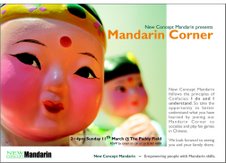 Chinese is a tonal language. Mandarin, the official Chinese language, has four tones and a neutral tone. The first tone is a high, level tone. That is when we put a number 1 after the pinyin. It sounds like when singing the note "la". The second tone is a rising tone. That is when we put a number 2 after the pinyin. It sounds like "far" when asking "Is it far?" The third tone is a falling-and-rising tone that starts mid-low, moves to the bottom of your voice and then rises to the middle. That is when we put a number 3 after the pinyin. It sounds like when you say "so?" irritably. The fourth tone is a falling tone. That is when we put a number 4 after the pinyin. It sounds like when you adamantly saying "No!".
Chinese is a tonal language. Mandarin, the official Chinese language, has four tones and a neutral tone. The first tone is a high, level tone. That is when we put a number 1 after the pinyin. It sounds like when singing the note "la". The second tone is a rising tone. That is when we put a number 2 after the pinyin. It sounds like "far" when asking "Is it far?" The third tone is a falling-and-rising tone that starts mid-low, moves to the bottom of your voice and then rises to the middle. That is when we put a number 3 after the pinyin. It sounds like when you say "so?" irritably. The fourth tone is a falling tone. That is when we put a number 4 after the pinyin. It sounds like when you adamantly saying "No!".If you are interested to find more information about the tones, please click here, you will get a better understanding.





